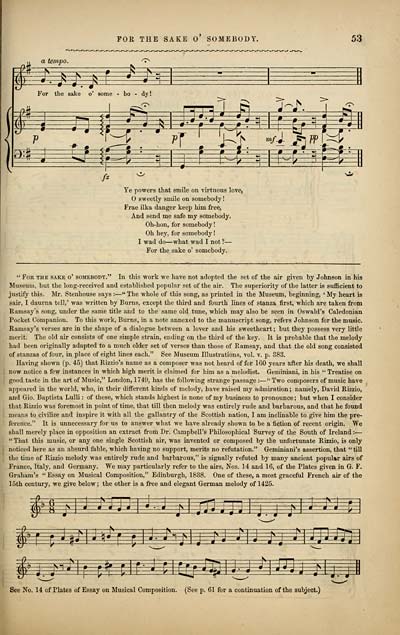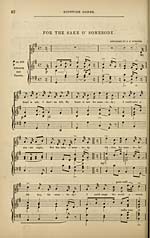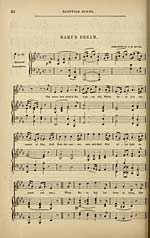Inglis Collection of printed music > Printed music > Songs of Scotland adapted to their appropriate melodies > Volume 2
(65) Page 53
Download files
Complete book:
Individual page:
Thumbnail gallery: Grid view | List view

FOB THE SAKE SOMEBODY.
53
Ye powers that smile on virtuous love,
sweetly smile on somebody !
Frae ilka danger keep him free,
And send me safe my somebody.
Oh-hon, for somebody !
Oh hey, for somebody !
I wad do — what wad I not ? —
For the sake o' somebody.
" For tue sake o' somebody." In this work we have not adopted the set of the air given by Johnson in his
Museum, but the long-received and established popular set of the air. The superiority of the latter is sufficient to
justify this. Mr. Stenhouse says : — " The whole of this song, as printed in the Museum, beginning, ' My heart is
sair, I daurna tell,' was written by Burns, except the third and fourth lines of stanza first, which are taken from
Ramsay"s song, under the same title and to the same old time, which may also be seen in Oswald's Caledonian
Pocket Companiou. To this work, Burns, in a note annexed to the manuscript song, refers Johnson for the music.
Ramsay's verses are in the shape of a dialogue between a lover and his sweetheart; but they possess very little
merit. The old air consists of one simple strain, ending on the third of the key. It is probable that the melody
had been originally adapted to a much older set of verses than those of Bamsay, and that the old song consisted
of stanzas of four, in place of eight lines each." See Museum Illustrations, vol. v. p. 383.
Having shown (p. 45) that Rizzio's name as a composer was not heard of for 160 years after his death, we shall
now notice a few instances in which high merit is claimed for him as a melodist. Geminiani, in his " Treatise on
good taste in the art of Music," London, 1749, has the following strange passage : — " Two composers of music have
appeared in the world, who, in their different kinds of melody, have raised my admiration ; namely, David Rizzio,
and Gio. Baptista Lulli : of these, which stands highest is none of my business to pronounce ; but when I consider
that Rizzio was foremost in point of time, that till then melody was entirely rude and barbarous, and that he found
means to civilize and inspire it with all the gallantry of the Scottish nation, I am inclinable to give him the pre-
ference." It is unnecessary for us to answer what we have already shown to be a fiction of recent origin. We
shall merely place in opposition an extract from Dr. Campbell's Philosophical Survey of the South of Ireland : —
" That this music, or any one single Scottish air, was invented or composed by the unfortunate Rizzio, is only
noticed here as an absurd fable, which having no support, merits no refutation." Geminiani's assertion, that " till
the time of Rizzio melody was entirely rude and barbarous," is signally refuted by many ancient popular airs of
France, Italy, and Germany. We may particularly refer to the airs, Nos. 14 and 16, of the Plates given in G. F.
Graham's " Essay on Musical Composition," Edinburgh, 1838. One of these, a most graceful French air of the
15th century, we give below ; the other is a free and elegant German melody of 1425.
i^
^
I
pst
m ^
- j-H-^U
^m
*=¥
I
JN-
ft-f4f -J
mm
^^
St
See No. 14 of Plates of Essay on Musical Composition. (See p. 61 for a continuation of the subject.)
53
Ye powers that smile on virtuous love,
sweetly smile on somebody !
Frae ilka danger keep him free,
And send me safe my somebody.
Oh-hon, for somebody !
Oh hey, for somebody !
I wad do — what wad I not ? —
For the sake o' somebody.
" For tue sake o' somebody." In this work we have not adopted the set of the air given by Johnson in his
Museum, but the long-received and established popular set of the air. The superiority of the latter is sufficient to
justify this. Mr. Stenhouse says : — " The whole of this song, as printed in the Museum, beginning, ' My heart is
sair, I daurna tell,' was written by Burns, except the third and fourth lines of stanza first, which are taken from
Ramsay"s song, under the same title and to the same old time, which may also be seen in Oswald's Caledonian
Pocket Companiou. To this work, Burns, in a note annexed to the manuscript song, refers Johnson for the music.
Ramsay's verses are in the shape of a dialogue between a lover and his sweetheart; but they possess very little
merit. The old air consists of one simple strain, ending on the third of the key. It is probable that the melody
had been originally adapted to a much older set of verses than those of Bamsay, and that the old song consisted
of stanzas of four, in place of eight lines each." See Museum Illustrations, vol. v. p. 383.
Having shown (p. 45) that Rizzio's name as a composer was not heard of for 160 years after his death, we shall
now notice a few instances in which high merit is claimed for him as a melodist. Geminiani, in his " Treatise on
good taste in the art of Music," London, 1749, has the following strange passage : — " Two composers of music have
appeared in the world, who, in their different kinds of melody, have raised my admiration ; namely, David Rizzio,
and Gio. Baptista Lulli : of these, which stands highest is none of my business to pronounce ; but when I consider
that Rizzio was foremost in point of time, that till then melody was entirely rude and barbarous, and that he found
means to civilize and inspire it with all the gallantry of the Scottish nation, I am inclinable to give him the pre-
ference." It is unnecessary for us to answer what we have already shown to be a fiction of recent origin. We
shall merely place in opposition an extract from Dr. Campbell's Philosophical Survey of the South of Ireland : —
" That this music, or any one single Scottish air, was invented or composed by the unfortunate Rizzio, is only
noticed here as an absurd fable, which having no support, merits no refutation." Geminiani's assertion, that " till
the time of Rizzio melody was entirely rude and barbarous," is signally refuted by many ancient popular airs of
France, Italy, and Germany. We may particularly refer to the airs, Nos. 14 and 16, of the Plates given in G. F.
Graham's " Essay on Musical Composition," Edinburgh, 1838. One of these, a most graceful French air of the
15th century, we give below ; the other is a free and elegant German melody of 1425.
i^
^
I
pst
m ^
- j-H-^U
^m
*=¥
I
JN-
ft-f4f -J
mm
^^
St
See No. 14 of Plates of Essay on Musical Composition. (See p. 61 for a continuation of the subject.)
Set display mode to: Large image | Transcription
Images and transcriptions on this page, including medium image downloads, may be used under the Creative Commons Attribution 4.0 International Licence unless otherwise stated. ![]()
| Special collections of printed music > Inglis Collection of printed music > Printed music > Songs of Scotland adapted to their appropriate melodies > Volume 2 > (65) Page 53 |
|---|
| Permanent URL | https://digital.nls.uk/94710060 |
|---|
| Shelfmark | Ing.128 |
|---|---|
| Additional NLS resources: | |
| Attribution and copyright: |
|
| Description | Scottish and English songs, military music and keyboard music of the 18th and 19th centuries. These items are from the collection of Alexander Wood Inglis of Glencorse (1854 to 1929). Also includes a few manuscripts, some treatises and other books on the subject. |
|---|
| Description | The Glen Collection and the Inglis Collection represent mainly 18th and 19th century Scottish music, including Scottish songs. The collections of Berlioz and Verdi collected by bibliographer Cecil Hopkinson contain contemporary and later editions of the works of the two composers Berlioz and Verdi. |
|---|

